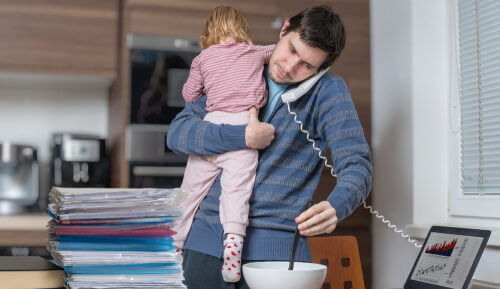
Carer ‘burnout’ is a term that means mental, physical or emotional exhaustion that has built up over time.
The term ‘burnout’ was introduced in America in the 1970s by psychologists Herbert Freudenberger and Christina Maslach, who used it specifically to describe the stress and exhaustion felt by healthcare professionals and those in other caring roles, such as teachers. Since 2019, it has also been recognised by the World Health Organisation.
While many people experience burnout due to stress at work, caring for others is a common cause too. Both paid and unpaid carers can struggle to switch off from their duties and often put themselves at the bottom of their list of priorities.
Carers UK’s ‘State of Caring 2024‘ report found that 61% of carers said the current cost of living crisis was making them worry about their caring responsibilities’ impact on their finances and 27% were struggling to make ends meet.
Why does burnout happen?
Burnout happens when stress goes unaddressed and gets worse to a point where a person is struggling to cope, leading to mental and physical distress.
If unaddressed, chronic stress can lead to burnout which can lead to habitual burnout, which can have long-term effects on physical and mental health, including depression, heart disease and even early death.
Signs and symptoms of carer burnout
Physical symptoms of burnout
- Feeling fatigued or physically exhausted
- Trouble sleeping as you can’t seem to switch off despite being tired
- Headache
- Stomach and bowel pains
- Nausea
- Tense muscles
- Increased use of unhealthy coping mechanisms, such as smoking, drinking, drugs or junk food
- High blood pressure
- Raised heartbeat
- Low sex drive
Mental symptoms of burnout
- Anxiety
- Irritability
- Lack of interest in your work, usual interests or in others
- Feeling resentful or even ‘compassion fatigue’, which is when you become cynical and desensitised to other people’s problems, often as a result of supporting others for a long time
- Withdrawing from your social life
- Difficulty concentrating and being productive
- Forgetfulness
- Low mood; you may feel panicky or even tearful at odd times for no immediate reason
- Feeling dissatisfied or stagnant in your life
- Always feeling like you need to do more
- Neglecting your own needs in order to care for or help others
- Depersonalisation
10 ways to help yourself to recover from carer burnout
Make practical changes to help you recover from this burnout and avoid it happening again in the future. Your current burnout could be a result of months’ worth of stress so give yourself recovery time too.
Your aim is to feel energetic again, physically and mentally, as well as well-rested.
1. Think about why you are burnt out
Have you taken on more caring responsibilities lately? When did you last have a day off? Determining what has caused your burnout is the first step in managing it. There may be nothing new, but your stress has simply built up over time.
2. Manage your time
When you care for someone or others regularly, it can feel like your time is not your own. Managing your time and setting boundaries is a good way to regain control of what time you give to others and what time is for you.
3. Learn to say no
A burden of being a caring person is that you can feel like you have never done enough for others or feel guilty if you don’t help those who ask. It may be that no one is asking anything unreasonable of you, but you are spinning too many plates at once. Learn to consider someone’s request for help before automatically saying yes. Do they really need you to help and does it need to be at that time? If it’s a favour for a friend, rather than caring for somebody vulnerable, does this person often ask big favours from you but give very little in return?
4. Look after your physical health
Looking after your physical health can do wonders for your mind. Exercise is a proven stress reliever and eating a healthy diet affects chemicals in the body and brain; the Mediterranean diet has even been shown to reduce symptoms of depression.
5. Make time to unwind
When managing your time, assign time each day to relax and unwind. It could be a daily bath, an hour of reading before bed, watching your favourite programme – anything that you find relaxing and enjoyable and is just for you. It doesn’t have to be alone, it could be eating dinner at the table with your partner each night with the telly switched off, but something that helps you to calm down and recharge.
6. Practise mindfulness
Mindfulness is a form of meditation that teaches you to be present in the moment and to manage your thoughts and emotions. It can reduce stress, anxiety and even help with depression. You can build your skills in mindfulness by practising each day. You can read more about mindfulness here.
7. Find a healthy way to relieve stress
It’s very normal to have a crutch when you are struggling with stress, other negative feelings or even just the monotony of life. However, reaching for a bottle of wine each night or using junk food to cheer you up can make you feel worse in the long run. Try to find a healthy coping mechanism to help you to clear your head and give you a boost. It could be cycling, gardening, knitting, learning a language – any activity that is just for you that you can look forward to each day and feel better for.
8. Find coping strategies for particularly stressful situations
Caring for others can come with many stressful situations. Find strategies to relax and not feel overwhelmed when something unexpected or difficult happens. It could be deep breathing, mindful thinking or taking a few minutes out to listen to a song that calms you.
9. Take time off
Carer burnout is usually caused by stress that builds up so you may just need a break. This could be some time off work, going on holiday or finding respite care for a few days. If you do a lot for a lot of people, it could be simply saying, “I’m not doing that this week but I can help you next week.”
10. Seek professional help
If you think you need external support with your burnout, you may wish to go to your doctor or hire a counsellor to help you through it. You may be assessed, such as using the Copenhagen Burnout Inventory (CBI) and/or be recommended talking therapy or other means to help you recover.
Helplines
| Carers UK advice line | 0808 808 7777 | advice@carersuk.org |
| Carers Direct | 0300 123 1053 | |
| Samaritans | 116 123 | jo@samaritans.org |
| SANEline | 0300 304 7000 |
FAQs
What is carer burnout?
‘Burnout’ is a term used to describe a mental and/or physical exhaustion felt by someone suffering from chronic stress. It’s not uncommon for carers to experience burnout, especially due to the pressure, responsibility and relentlessness of caring for others. They can experience a number of unpleasant physical and mental effects.
What are the signs of carer burnout?
Signs that a carer is experiencing burnout can be mental and physical. Mental symptoms include that they are particularly down, stressed and irritable, are showing resentment or apathy towards others and are not looking after themselves. Physical symptoms can include fatigue but being unable to sleep well, headaches, stomach pains, nausea and a raised heartbeat.
How can you recover from carer burnout?
It’s important to recover properly from burnout because if it goes unaddressed, burnout can lead to chronic burnout which can affect your health or even mortality. This article includes 10 tips to recover from carer burnout.

Find a provider near you



